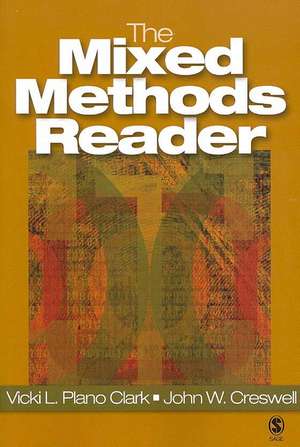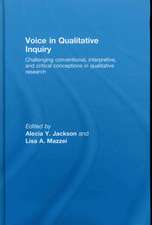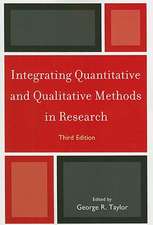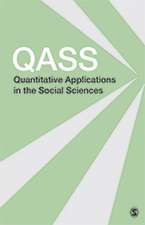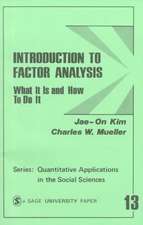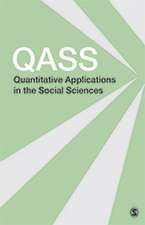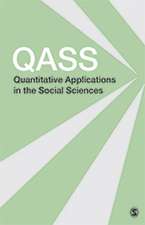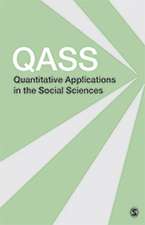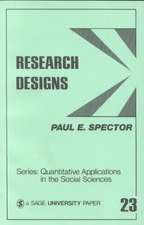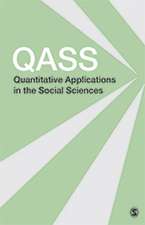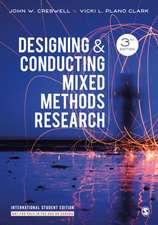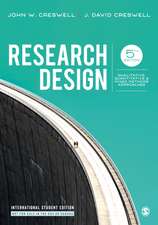The Mixed Methods Reader
Editat de Vicki L. Plano Clark, John W. Creswellen Limba Engleză Paperback – 11 feb 2008
| Toate formatele și edițiile | Preț | Express |
|---|---|---|
| Paperback (1) | 933.83 lei 6-8 săpt. | |
| SAGE Publications – 11 feb 2008 | 933.83 lei 6-8 săpt. | |
| Hardback (1) | 1220.64 lei 6-8 săpt. | |
| SAGE Publications – 4 feb 2008 | 1220.64 lei 6-8 săpt. |
Preț: 933.83 lei
Preț vechi: 1138.82 lei
-18% Nou
Puncte Express: 1401
Preț estimativ în valută:
178.71€ • 194.05$ • 150.12£
178.71€ • 194.05$ • 150.12£
Carte tipărită la comandă
Livrare economică 22 aprilie-06 mai
Preluare comenzi: 021 569.72.76
Specificații
ISBN-13: 9781412951456
ISBN-10: 1412951453
Pagini: 640
Dimensiuni: 152 x 229 x 27 mm
Greutate: 0.74 kg
Ediția:1
Editura: SAGE Publications
Colecția Sage Publications, Inc
Locul publicării:Thousand Oaks, United States
ISBN-10: 1412951453
Pagini: 640
Dimensiuni: 152 x 229 x 27 mm
Greutate: 0.74 kg
Ediția:1
Editura: SAGE Publications
Colecția Sage Publications, Inc
Locul publicării:Thousand Oaks, United States
Recenzii
"It premieres the most adept researchers in the field who have bravely and soundly followed mixed methodology approaches."
"Excellent book for students gaining a masters or doctorial degree."
"Excellent book for students gaining a masters or doctorial degree."
Cuprins
List of Editor's Introduction Figures
Introduction
Part I. Methodological Selections
Chapter 1. The Evolution of Mixed Methods Research
Chapter 2. Pragmatism as a Philosophical Foundation for Mixed Methods Research
Chapter 3. The Transformative-Emancipatory Perspective as a Philosophical Foundation for Mixed Methods Research
Chapter 4. Triangulation as the First Mixed Methods Design
Chapter 5. Identifying the Purposes for Mixed Methods Designs
Chapter 6. A Notation System for Mixed Methods Designs
Chapter 7. An Expanded Typology for Classifying Mixed Methods Research Into Designs
Chapter 8. Different Sampling Techniques for Mixed Methods Studies
Chapter 9. Data Analysis Strategies in Mixed Methods Research
Chapter 10. Expanding the Reasons for Conducting Mixed Methods Research
Chapter 11. Types of Legitimation (Validity) in Mixed Methods Research
Chapter 12. Powerful Rhetorical Devices Used in Writing Mixed Methods Research
Chapter 13. An Improved Role for Qualitative Research in Mixed Methods
Chapter 14. An Alternative to Reconciling the Different Realities of Qualitative and Quantitative Research
Part II. Exemplar Research Studies
Chapter 15. A Concurrent/Triangulation Mixed Methods Design With Merged Results
Chapter 16. A Concurrent/Triangulation Mixed Methods Design With Data Transformation
Chapter 17. An Embedded Experimental Before-Intervention Mixed Methods Design
Chapter 18. An Embedded Experimental During-Intervention Mixed Methods Design
Chapter 19. An Embedded Experimental After-Intervention Mixed Methods Design
Chapter 20. A Sequential Explanatory Mixed Methods Design to Explain Findings
Chapter 21. A Sequential Explanatory Mixed Methods Design With Participant Selection
Chapter 22. A Sequential Exploratory Mixed Methods Design With Instrument Development
Chapter 23. A Sequential Exploratory Mixed Methods Design to Generate and Test a Model
References Cited in the Editors' Introductions
Index
Introduction
Part I. Methodological Selections
Chapter 1. The Evolution of Mixed Methods Research
Chapter 2. Pragmatism as a Philosophical Foundation for Mixed Methods Research
Chapter 3. The Transformative-Emancipatory Perspective as a Philosophical Foundation for Mixed Methods Research
Chapter 4. Triangulation as the First Mixed Methods Design
Chapter 5. Identifying the Purposes for Mixed Methods Designs
Chapter 6. A Notation System for Mixed Methods Designs
Chapter 7. An Expanded Typology for Classifying Mixed Methods Research Into Designs
Chapter 8. Different Sampling Techniques for Mixed Methods Studies
Chapter 9. Data Analysis Strategies in Mixed Methods Research
Chapter 10. Expanding the Reasons for Conducting Mixed Methods Research
Chapter 11. Types of Legitimation (Validity) in Mixed Methods Research
Chapter 12. Powerful Rhetorical Devices Used in Writing Mixed Methods Research
Chapter 13. An Improved Role for Qualitative Research in Mixed Methods
Chapter 14. An Alternative to Reconciling the Different Realities of Qualitative and Quantitative Research
Part II. Exemplar Research Studies
Chapter 15. A Concurrent/Triangulation Mixed Methods Design With Merged Results
Chapter 16. A Concurrent/Triangulation Mixed Methods Design With Data Transformation
Chapter 17. An Embedded Experimental Before-Intervention Mixed Methods Design
Chapter 18. An Embedded Experimental During-Intervention Mixed Methods Design
Chapter 19. An Embedded Experimental After-Intervention Mixed Methods Design
Chapter 20. A Sequential Explanatory Mixed Methods Design to Explain Findings
Chapter 21. A Sequential Explanatory Mixed Methods Design With Participant Selection
Chapter 22. A Sequential Exploratory Mixed Methods Design With Instrument Development
Chapter 23. A Sequential Exploratory Mixed Methods Design to Generate and Test a Model
References Cited in the Editors' Introductions
Index
